Microsoft ends support for Internet Explorer on June 16, 2022.
We recommend using one of the browsers listed below.
- Microsoft Edge(Latest version)
- Mozilla Firefox(Latest version)
- Google Chrome(Latest version)
- Apple Safari(Latest version)
Please contact your browser provider for download and installation instructions.
September 8, 2016
NTT and Ars Electronica Futurelab, an international media art research institute, to start joint research on user experience enhancement through "the fusion of ICT and art" ~Promoting the creation and research of new concepts through state-of-the-art tech
The Nippon Telegraph and Telephone Corporation (Headquarters: Chiyoda Ward, Tokyo, President & CEO: Hiroo Unoura, hereinafter referred to as NTT) and the international media art research institute Ars Electronica Futurelab (Linz, Austria Director: Horst Hortner) agreed today to conduct a joint research in the goal of enhancing user experiences through the fusion of ICT and art.
Through this joint research that brings together NTT's state-of-the-art technology such as artificial intelligence and media processing technology and Ars Electronica Futurelab's skills and know-how on creative thinking, they plan to promote the creation and research of new concepts in hopes to be able to provide "new experiences and experiences that move the hearts of people as well as hospitality" in public spaces moving forward into 2020.
In addition, the first series of results from the research was revealed at the "Ars Electronica Festival 2016", an international media art event organized by Ars Electronica.
-
Ars Electronica Center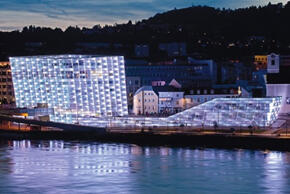
-
Ars Electronica Festival 2016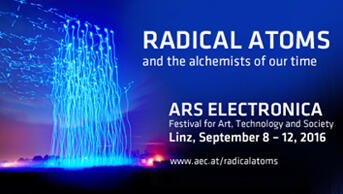
Photo: Nicolas Ferrando, Lois Lammerhuber
Background
As one of the most prominent comprehensive research institutes in the world in the field of information and communication technology, the NTT R&D Laboratories conduct research on infrastructure technology for new communication services and communication network and state-of-the-art basic technologies looking forward to ten years into the future. Besides that, to create hospitable and moving experiences to a multitude of people including international tourists visiting Japan in 2020, they have been conducting trial experiments in public spaces like Terminal 1 in Haneda Airport (*1), commercial facilities in the Namba area (*2), SXSW2016 (*3), Japan KABUKI Festival in Las Vegas 2016 (*4), etc.
Since its establishment, Ars Electronica Futurelab (*5), based at the Ars Electronica Center in Linz, Austria, has been conducting research, education, and social activities with media art. Linz, the city at which it is based, is known worldwide as a city with a lively scene of contemporary art due to many years of activity by Ars Electronica. Ars Electronica Futurelab has connections with global leaders and visioners of cutting-edge technology and art, and the futuristic new concepts and visions created by the Ars Electronica Futurelab strongly influences creative companies around the world (*6).
Outline of the joint research
The joint research is not only a further innovation on the newest ICT which is the strength of NTT. By combining it with the strengths of Ars Electronica Futurelab, skills and know-how in creative thinking, the joint research hopes to promote the creation and research of new concepts and to come up with new, moving experiences and develop new services and future concept models that can touch the senses and emotions of humans in a way that has never been done before. Specifically, the research will have themes like "artificial intelligence", "IoT/robotics", "high realistic media", "big data", "UI/UX", "human information science", etc.
First series of results to be revealed at the Ars Electronica Festival 2016
(Linz, Austria, September 8 - 12). Organized by Ars Electronica (*7), it is a globally known media arts festival with exhibitions of innovative media art and symposiums at the intersection between art, technology and society. The results of the joint research had been jointly exhibited as below.
(Reference: Number of exhibits in 2016,: 534, 85,000 participants from 42 countries)
1.Exhibition app to enhance visitor experiences: Ars Wild Card+ (*8)
By equipping "Ars Wild Card", the app that scans the QR codes of exhibits and identifies the exhibit items, with NTT's angle-free object-search technology (*9), users can identify exhibit items using their camera function of the app even without the need to scan QR codes. In addition, the exhibit items can be printed as souvenir postcards to bring home.
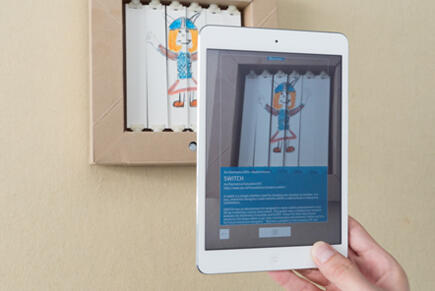
1.ignboards with surprising effects and participatory workshop
With the technology of protean lights (*10) developed by NTT, originally static printed navigation signboards throughout the venue and pictures drawn by visitors will look like they are moving. This is different from devices for dynamic displays like digital signage, but the printed materials, signboards, and the floor that should be static will look like they are moving. Besides that, at the workshop based on the main theme of the festival, "Alchemists of Our Time", the faces of imaginary alchemists drawn by visitors will come to life and start moving on the spot.
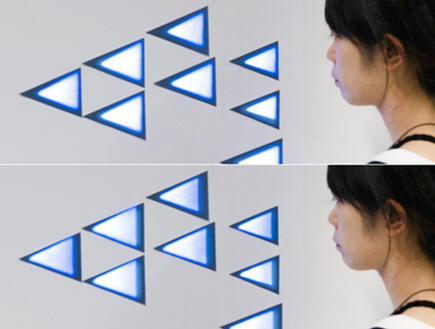
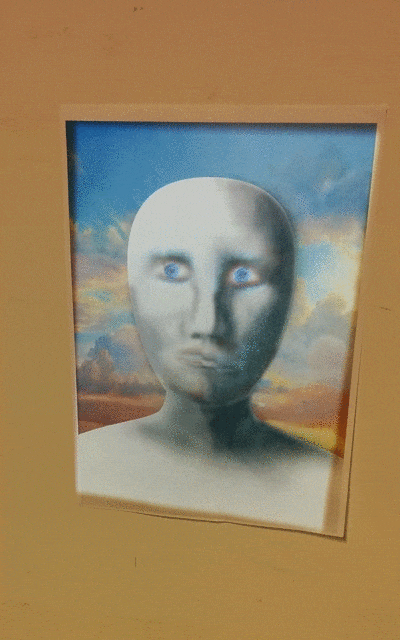
-
Start of joint research on the enhancement of universal designs of airport information
http://www.ntt.co.jp/news2015/1512/151203a.html (japanese) -
Start of trial experiment of the O2O2O customer-moving services at commercial facilities in the Namba area
http://www.ntt.co.jp/news2016/1606/160608a.html (japanese) -
NTT exhibits a showcase using cutting-edge AI/IoT/video technologies at SXSW2016, the world's largest business and content festiva
http://www.ntt.co.jp/news2016/1603e/160303a.html -
NTT achieves the fusion of Kabuki and ICT at the Niconico Chokaigi 2016 and Japan KABUKI Festival in Las Vegas 2016
http://www.ntt.co.jp/news2016/1604/160419a.html (japanese) -
http://www.aec.at/futurelab/en/
-
The Making of Drone 100
https://www.youtube.com/watch?v=nTwX1Z68qMY -
http://www.aec.at/festival/jp/
-
ARS WILD CARD+
http://awc.aec.at/ -
Development of "angle-free object-search technology", a technology that enables users to accurately identify, search, and provide information on three-dimensional objects by photographing it from any angle
http://www.ntt.co.jp/news2015/1502/150216a.html (japanese) -
Protean light (Technical information page)
http://www.brl.ntt.co.jp/cs/human/hengentou/(japanese)
Contact Information
Service Innovation Laboratory Group
Planning Department Spokesperson
E-mail:randd-ml@hco.ntt.co.jp
Information is current as of the date of issue of the individual press release.
Please be advised that information may be outdated after that point.
NTT STORY
WEB media that thinks about the future with NTT











